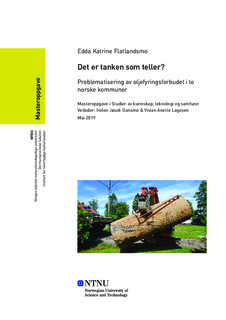| dc.description.abstract | Norge har forpliktet seg til å redusere klimagassutslipp med 40% frem til 2030. Allerede i 2012 varslet Stortinget at et mulig oljefyringsforbud kunne komme, men nå er det formelt vedtatt med virkning fra 1. januar 2020. I løpet av året 2019 må alle som benytter parafin eller fossil olje som oppvarming gå over til en alternativ energikilde. Selv om det er eieren av fyringsanlegget som står ansvarlig for å følge forskriften, er det kommunene som får håndhevingsansvaret. Er kommunene rustet til forbudets ikrafttredelse i år 2020?
Oppgavens problemstilling er å undersøke hvordan oljeutfasing til oppvarming ble etablert som et problem som utløste et nasjonalt oljefyringsforbud, og hvordan Trondheim og Porsgrunn kommune har tolket og inkorporert forbudet i sitt eksisterende arbeid. Masteravhandlingen baserer seg på kvalitativ forskningsmetode. Datamateriale består av intervjuer med 13 informanter, som enten har foregått ansikt-til-ansikt, per e-post eller telefon, og jeg anvender STS-perspektivet aktør-nettverksteori som teoretisk rammeverk.
Det skilles mellom utfasingen av selve oljefyringsanlegget, som bidrar til klimagassutslipp, og fjerning av oljetanken, som reduserer miljøforurensning; altså er det en to-delt problematikk. Dette gjelder både internt (kommunens egne bygg) og eksternt (innbyggernes bolig) oljeutfasing. I denne oppgaven undersøker jeg hvordan det nasjonale oljefyringsforbudet blir et problem som kommunene må løse og hvordan de velger å løse det.
Jeg finner at oljeutfasing innen oppvarming først ble problematisert av Naturvernforbundet, som til slutt fikk mobilisert myndighetene til å vedta et nasjonalt oljefyringsforbud. Følgelig gikk det fra lokalt initiativ, opp til nasjonalt forbud, men så ned igjen til kommunal håndheving. Jeg finner videre at kommunene har ulike utgangspunkt for håndteringen av forbudet, både innen kompetanse, ressurser og økonomiske midler. Trondheim og Porsgrunn kommune ser ut til å ha tolket forbudets «bruksanvisning» på to ganske forskjellige måter, som har ledet til en konstruksjon av ulike montasjer, altså løsninger. Med andre ord signaliserer dette at det finnes mange ulike tilnærminger til å «temme» og mobilisere forbudet. Altså tyder oppgavens funn på at selv om forbudet er vedtatt, med tilhørende «bruksanvisning», betyr ikke dette at alle kommunene vil konstruere identiske montasjer.
Til slutt peker jeg på at til tross for kommunenes montasjer av problemforståelsen og planlagte løsninger, så er det sannsynlig at problematikken tilknyttet klimagassutslipp vil løse seg selv, side tilgangen til fyringsolje vil falle bort. Oljetanker, derimot, er det som vil ha størst innvirkning på miljø, og dette problemet vil ikke løse seg selv. Dermed er det kanskje «tanken» som vil telle når oljeforbudet trer i kraft i 2020. | |
| dc.description.abstract | Norway has committed to reducing greenhouse gas emissions by 40% within 2030. Already in 2012, the Norwegian Parliament announced the possibility of a national oil heating ban, and now it is formally decided. During the year 2019, anyone who uses fossil oil as heating must switch to an alternative energy source. Although it is the owner of the oil burner that is responsible for complying with the upcoming regulations, the municipalities are responsible for the enforcement. Are the municipalities prepared for the arrival of the oil heating ban in the year 2020?
This thesis aims to answer how the phasing out of oil for heating was established as a problem that triggered a national oil heating ban, and how Trondheim and Porsgrunn municipality have interpreted and incorporated the ban into their existing work. Methodologically, the thesis draws on qualitative research method, and the data material consists of interviews with 13 informants, who have either been face-to-face, by e-mail or telephone. Theoretically, the thesis draws on the STS-perspective actor-network theory, to investigate how the different actors understand the oil heating ban.
A distinction is made between the phasing out of the oil burner itself, which contributes to greenhouse gas emissions, and the removal of the oil tank, which reduces environmental pollution. Thus, is it a two-part problem. Both regarding internal (the municipality's own buildings) and external (residents' housing) phasing out of oil. In this thesis, I examine how the national oil heating ban becomes a problem that the municipalities must solve and how they choose to solve it.
In answer to the research question, I found that the phasing out of oil for heating was first problematized by the Norwegian Society for the Conservation of Nature, which ultimately got the authorities to implement a national oil heating ban. Consequently, it went from a local initiative up to a national ban, but then back down to municipal enforcement. I also found that the Trondheim and Porsgrunn have different basis for the handling of the ban. The municipalities seem to have interpreted the ban’s «instructions» in two quite different ways, which has led to a construction of two separate «assemblages», i.e. solutions. Thus, the task’s finding suggests that even if the ban has been decided, with the accompanying instructions, this does not mean that all municipalities will construct identical assemblages.
Finally, I point out that despite the municipalities’ assemblages of the understanding of the problem and planned solutions, it is likely that the problem associated with greenhouse gas emissions will solve itself, since access to heating oil will disappear. Oil tanks, on the other hand, are what will have the greatest impact on the environment, and this problem will not solve itself. Thus, maybe it is the tank that will count when the oil ban enters into force in 2020. | |
